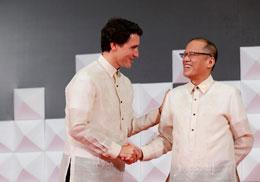Policies not president will help Philippines investments

Canadian businessmen are holding back investments in the Philippines for fear that the current policies on foreign investments would change after the May elections, the president of the Canadian Chamber of Commerce of the Philippines said.
“(Investors are) not so much looking at the specific outcome of elections than they’re looking at what is happening to the legislation, and rules and regulations covering foreign investment,” chamber president Julian Payne told reporters during the group’s monthly meeting in Cebu.
He said investors will be “closely watching” what the presidential candidates have to say with regard to investments.
Payne cited the Canadian mining companies which are interested in what candidates have to say about mining opportunities in the country.
“If the current Mining Act is retained, the provisions of E.O. (executive order 79) regarding foreign investments changed and if your basic tax framework remains unchanged, you can expect more investments in mining,” he said.
Cebu and the Philippines, in general, still have a relatively low number of Canadian investors.
In Cebu, two major Canadian investors are business process outsourcing (BPO) company Bombardier Transportation, and the $20-million waste-to-energy plant at the Mactan Economic Zone (MEZ) zone 3 in Lapu-Lapu City by Aquilini Mactan Renewable Energy, Inc. (AMREI).
Payne said the lack of Canadian investors is due not only to the foreign investment restrictions that turn off investors, but also to the fact that Canada came as a late player in the Philippines.
“The main problem or challenge in the Philippines is restrictions on foreign investment,” Payne said.
However, if the Philippines can score more trans-Pacific partnerships (TPP) or clinch a free trade agreement with Canada, Canadian investors will see the country as more appealing.
Payne noted that Canada Prime Minister Justin Trudeau has already expressed a desire to review trade agreements with the Philippines.
No commitments nor definite action plans have been made, but Payne expressed hope that they will be firmed up in the future.
Canada’s first investment entry in the Philippines came at the turn of the century through financial services providers Sunlife and Manulife. The second wave of Canadian involvement in the Philippines was through religious missionaries in the late 1940s.
Its third involvement with the Filipinos was in the 1970s, which Payne said marked the “beginning of the real migration of Filipinos to Canada.”
Payne said Canada, because of its aging population, is still looking for caregivers and nurses.
Currently, Filipinos represent an estimated 2.5 percent of Canada’s 35 million population. Filipinos continue to represent the largest number of immigrants in the country, and are very rapidly growing in number.
Payne said Canada’s newly elected government may serve to benefit Filipinos already working in Canada, or those who intend to move to the country.
Included in their government’s preliminary statements of intent are provisions for easier immigration or increased family-class immigration to Canada, and negotiation of trade agreements.
Meanwhile, demonstrating its commitment to enhanced relations with a region on the other side of the planet, the Canadian government has appointed Marie-Louise Hannan as the country’s new ambassador to the Association of Southeast Asian Nations (ASEAN).
“The appointment is significant in that it is the first time Canada has had a dedicated ambassador to ASEAN,” the government said in a press release.
Canada already increased its diplomatic presence in the ASEAN region with the opening of its first resident diplomatic mission in Yangon, Myanmar in 2013, and in August 2015 opened offices in Phnom Penh, Cambodia, and Vientiane, Laos, “thereby ensuring for the first time a permanent, resident Canadian diplomatic presence in all 10 ASEAN member states,” the statement read.
As a group, ASEAN is Canada’s seventh-largest merchandise trading partner. In 2014, Canada-ASEAN merchandise trade reached US$18.8 billion.
Canada continues to partner with ASEAN on concrete initiatives in key areas, including disaster risk management, human rights, the countering of non-traditional security threats, public-private infrastructure partnerships and support for small and medium-sized enterprises.
Canada has been an ASEAN dialogue partner, one of only 10 countries enjoying such a status, since 1977. Canada and ASEAN will celebrate 40 years of dialogue partnership in 2017.






